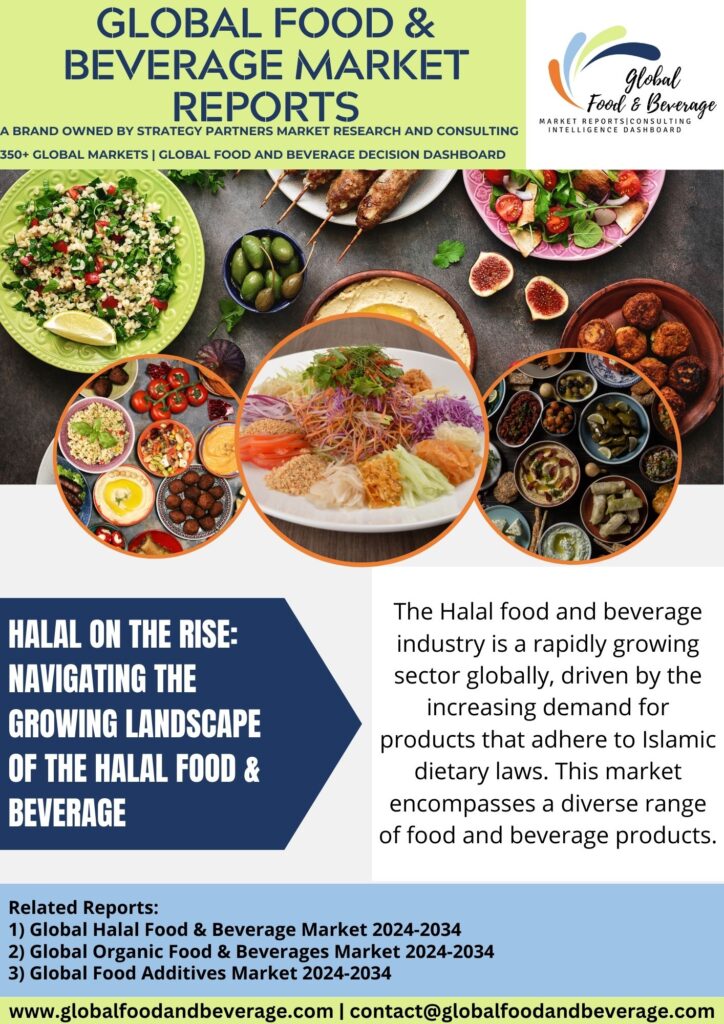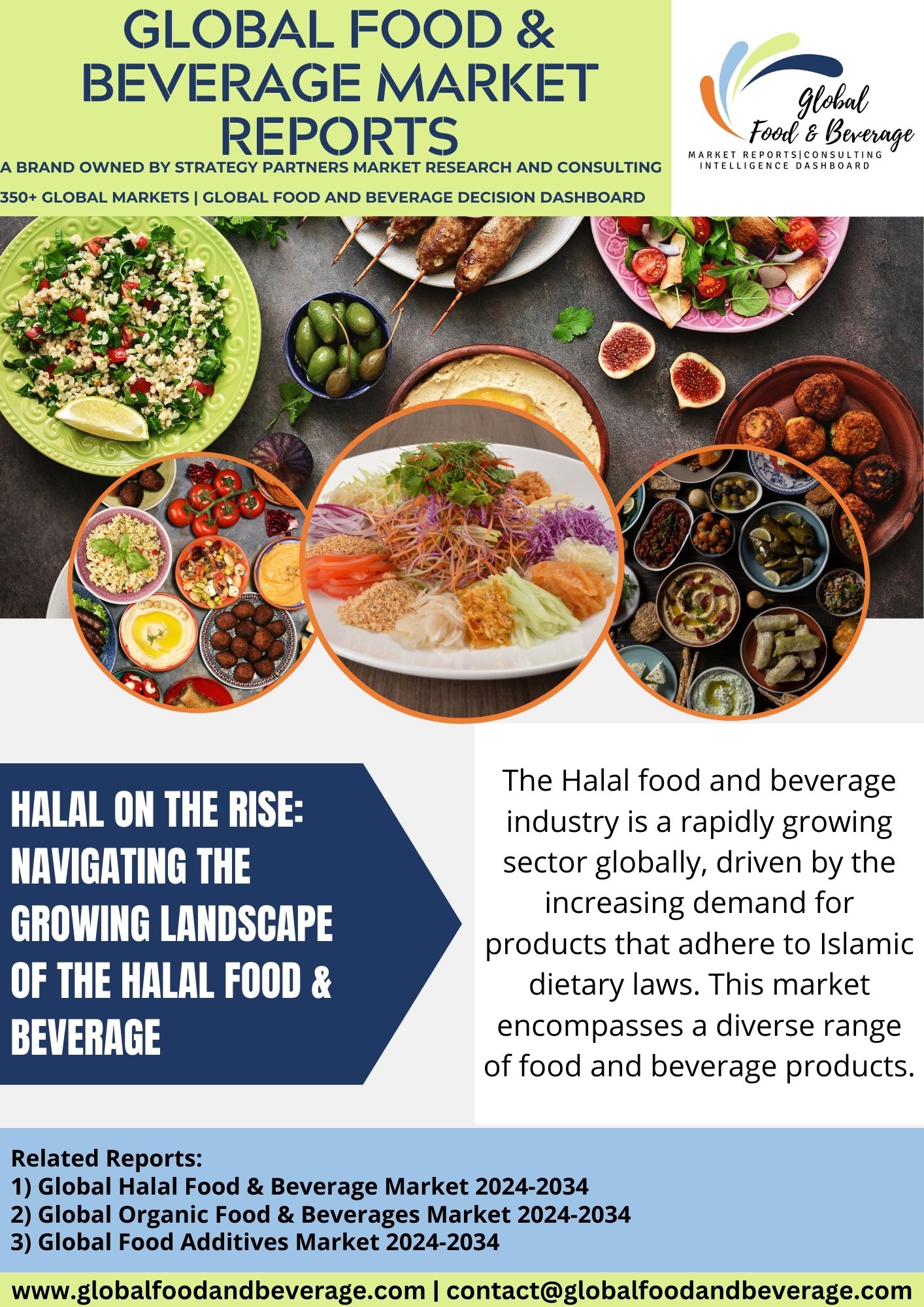Halal on the Rise: Navigating the Growing Landscape of the Halal Food and Beverage Market
Halal food and beverages adhere to Islamic dietary laws, reflecting a set of principles and practices that govern the consumption of food and drink for Muslims. The term “halal” translates to “permissible” in Arabic, and it encompasses not only the ingredients used but also the methods of preparation and processing. For a product to be considered halal, it must meet the criteria outlined in Islamic dietary guidelines, avoiding prohibited substances such as pork and alcohol.

Halal food and beverages play a significant role in the lives of Muslims worldwide, influencing their choices in grocery shopping, dining out, and overall dietary habits. The concept of halal extends beyond individual ingredients, emphasizing the importance of ethical and hygienic practices throughout the entire food production process. This includes the sourcing of raw materials, the methods of slaughter for meat, and the avoidance of cross-contamination with non-halal items.
The demand for halal products has grown not only among Muslim consumers but also in the broader market, driven by an increased awareness of diverse dietary preferences and cultural inclusivity. Food manufacturers and restaurants recognize the importance of catering to a diverse customer base, and as a result, many offer a range of halal-certified options. This inclusivity extends to various food categories, including snacks, beverages, frozen foods, and even confectionery.
Halal certification serves as a crucial indicator for consumers, assuring them that a product aligns with halal standards. Certification is typically granted by recognized halal certifying bodies, ensuring that the entire production process, from sourcing to packaging, complies with Islamic dietary regulations. The accessibility of halal food and beverage options provides convenience for Muslims and facilitates a more inclusive and diverse food landscape for everyone.
ADVANCEMENTS
The Halal food and beverages industry reflect a growing awareness and demand for products that adhere to Islamic dietary principles. One significant breakthrough is the development of a wider range of Halal-certified options. Manufacturers are increasingly obtaining Halal certifications for their products, expanding the availability of diverse food and beverage choices for Muslim consumers. This includes not only traditional staples but also convenience foods, snacks, and beverages.
Innovations in food processing and technology have improved the traceability and transparency of Halal products. Advanced supply chain management systems, including blockchain technology, enable consumers to access detailed information about the sourcing and production of Halal food and beverages, enhancing trust and confidence in the authenticity of these products.
The emergence of Halal-friendly additives, flavorings, and processing aids contributes to the improvement of taste and quality in Halal products. Manufacturers are investing in research to develop Halal-compliant alternatives, ensuring that the flavor profiles and textures meet the expectations of consumers while adhering to Islamic dietary laws.
Advancements in packaging technology address the needs of Halal consumers, providing information about the Halal status of products and ensuring that packaging materials comply with Islamic principles. Transparent and informative labeling is becoming a standard practice, allowing consumers to make informed choices based on their religious dietary requirements.
The growth of e-commerce platforms specializing in Halal products has expanded access for consumers worldwide. Online marketplaces dedicated to Halal food and beverages facilitate convenient shopping and global distribution of Halal-certified products, connecting producers with a broader international audience.
CHALLENGES
The production and consumption of halal food and beverages face several challenges, spanning from sourcing and production to market dynamics and regulatory compliance. One significant challenge is ensuring the authenticity and adherence to halal standards throughout the supply chain. From sourcing raw materials to manufacturing processes, maintaining halal integrity demands meticulous oversight to meet the expectations of halal-conscious consumers.
Supply chain complexities add another layer of challenge to the halal food and beverage industry. Ensuring that all components of a product, including additives and flavorings, comply with halal requirements requires transparency and collaboration with suppliers. Establishing a robust and traceable supply chain is essential for addressing potential concerns related to contamination or non-compliance.
Regulatory compliance poses challenges, as halal standards may vary across regions and countries. Navigating diverse regulations demands continuous diligence to ensure transparency, accurate labeling, and compliance with the evolving landscape of halal certifications. Harmonizing standards globally is an ongoing challenge in facilitating international trade of halal products.
Market competition is intense, with a growing number of halal products entering the market. Successfully differentiating products, addressing diverse taste preferences, and maintaining a competitive edge demand continuous innovation in flavors, formulations, and marketing strategies.
Consumer education and awareness are crucial challenges in the halal food and beverage industry. Effectively communicating the benefits of halal products, the importance of halal certification, and dispelling misconceptions is essential for building consumer trust and promoting informed choices.
CONCLUSION
Halal food and beverages exemplify a culinary and cultural bridge, catering to diverse global tastes while upholding religious principles. Beyond compliance with Islamic dietary laws, the Halal industry resonates with a broader demand for transparency, ethical sourcing, and quality assurance. As consumer awareness grows, so does the significance of Halal certification, becoming a symbol of trust and inclusivity. The industry’s adaptation to diverse tastes and evolving preferences underscores its resilience and responsiveness. The future of Halal food and beverages promises not just compliance but a dynamic and flavorful journey where tradition, modernity, and culinary excellence converge, creating a rich tapestry of global gastronomy.
